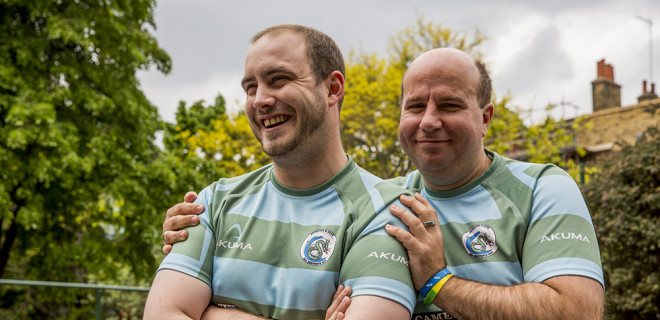If we could sit down with everyone in the world to tell them how much HIV has changed since the 1980s, we would. That’s because outdated beliefs about HIV stop people from getting tested and accessing treatment, and fuel the stigma which so badly impacts many people living with HIV.
The opportunity to do that doesn’t come along very often. But when former Wales rugby captain Gareth Thomas spoke publicly about living with HIV for the first time in September, we were ready to maximise that incredible opportunity to bring about change.
We were privileged to be part of Gareth’s groundbreaking documentary HIV & Me, where he visited our team in Cardiff to find out more about their vital work supporting people living with HIV and providing testing. While there he met three very different people who are living with HIV, including Jess who speaks powerfully about the stigma she’s experienced at her son’s school gates.

Gareth speaking out also led to a spike in people ordering HIV tests, finding out that effective treatment means people living with HIV Can’t Pass It On, and contacting our helpline THT Direct for advice and information.
We then worked with Gareth and The Duke of Sussex to turn the media’s spotlight on the importance of everyone getting tested and knowing their HIV status, and were delighted to announce Gareth as an HIV Commissioner alongside NAT to play a crucial role in ending HIV transmission over the next decade.
Sharing the stories of people living with HIV
A key part of our work will always be working with people directly affected by HIV to share their stories and help shape the media’s narrative around the virus.
This year we worked with a range of incredible people to get more people testing during National HIV Testing Week, to promote Can’t Pass It On and to illustrate the very real impact of stigma and discrimination on people living with HIV:
Getting into people's living rooms
This year we got to talk to people about HIV while they had their lunch or a cup of tea thanks to programmes like This Morning, Loose Women and BBC Breakfast.
Dr Ranj, our brilliant face of National HIV Testing Week, did a live HIV test for Holly and Phil on This Morning, while Gareth Thomas joined the Loose Women to talk about his story and the importance of everyone knowing their status.

Getting into people's living rooms
To mark the anniversary of our namesake Terry Higgins’s death, BBC Breakfast spoke to Sasha and her son LJ, Montse and Alberto, and our programme officer Alex Sparrowhawk about the impact of knowing effective treatment means HIV can’t be passed on.
This fact is a big departure from the messaging in the 1980s and we found that just 19% of people believe it, despite its being based on two large studies and endorsed by hundreds of global organisations – so definitely a continuing challenge into the next decade.
Representation matters
This year our media work for National HIV Testing Week was led by a black woman and it had a huge impact. Lateefah built strong relationships with women living with HIV to share their stories as well as with journalists keen to amplify the voices of different communities impacted by the virus.
Highlights included Horcelie Sinda sharing her story of being born with HIV to Marie Claire and joining sexual health nurse Sarah Mulindwa to talk about National HIV Testing Week with Claudia-Liza Armah on 5 News. Three black women talking about the sexual health of black women!
Marking the progress made
When we look ahead to the opportunity to end new HIV transmissions by 2030, oi’s important to reflect on where we’ve come from.
This World AIDS Day, we worked with Attitude to share the stories of five activists who were diagnosed at different points of the epidemic: from Jonathan Blake, one of the first to be diagnosed in the entire country and given a terminal diagnosis, through to George, who was told medication would ensure he lives a long, healthy life.
As the film shows, we’ve come a long way in the fight against HIV – but it’s not over. Roll on 2020...


